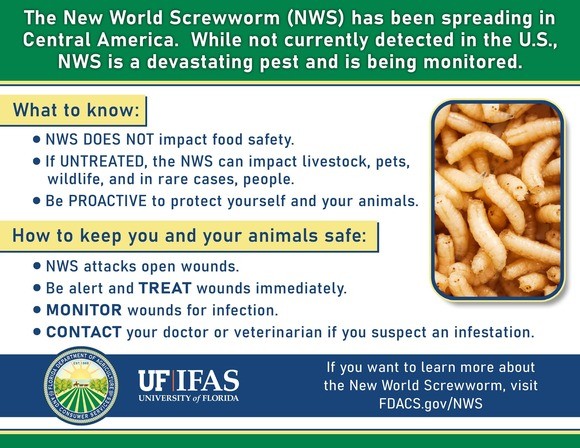TALLAHASSEE, Fla. – Today, Florida Commissioner of Agriculture Wilton Simpson and the Florida Department of Agriculture and Consumer Services (FDACS) are urging veterinarians, livestock producers, and animal health professionals to remain vigilant as the threat of New World Screwworm (NWS) reintroduction into the United States grows due to the pest’s continued movement through Mexico.
Although there have been no detections in the U.S., FDACS is closely coordinating with federal and regional partners to monitor the situation. The New World Screwworm – a destructive parasite that targets warm-blooded animals – was eradicated from the U.S. more than four decades ago. Its return would pose a serious threat to livestock, wildlife, and domestic animals, particularly in states like Florida with warm climates and abundant animal populations.
“This is about protecting American agriculture, plain and simple,” said Commissioner Simpson. “We know how costly and dangerous this pest can be if it takes hold. We’re calling on Florida’s producers, veterinarians, and animal health professionals to remain aware and act quickly if they suspect something unusual.”
Florida State Veterinarian Dr. Michael Short emphasized the importance of early detection: “The earlier we catch a potential case, the better chance we have of containing it. We’re asking everyone who works with animals – whether in private practice or in the field – to take a second look at any wound that is unusual or doesn’t heal as expected.”
FDACS emphasizes the importance of early detection and reporting. The department is working to ensure informational resources are available to assist in identifying signs of screwworm infestation – particularly in wounds or sites of tissue damage on livestock, pets, or wildlife.
Additionally, FDACS is providing updated resources to help frontline responders identify signs of screwworm infestation. These typically appear as slow-healing wounds containing larvae. Prompt reporting is critical to protect both animal health and the state’s agricultural economy.
While the screwworm remains outside U.S. borders, Florida’s agriculture community understands the value of staying ahead of the threat. The continued strength of American agriculture depends on shared responsibility and strong coordination from the local level up.
Anyone who suspects the presence of screwworms or has questions or concerns can contact:
- Phone: (850) 410-0900 (during office hours) or 1-800-342-5869 (after hours)
- Email: RAD@FDACS.gov
- Report online at: www.FDACS.gov/RAD
To report sick or injured wildlife, including a suspected screwworm infestation, call the Florida Fish and Wildlife Conservation Commission (FWC) at 1-888-404-FWCC (3922) or email the Wildlife Health Team at WildlifeHealthTeam@MyFWC.com.
For more information, resources, and updates, visit FDACS.gov/NWS.

